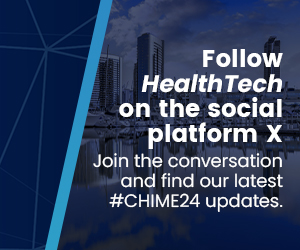How Baptist Health Demystified Generative AI
“We have a lot of confusing asks every single day,” Miri told a packed meeting room of other healthcare leaders. “Doesn’t matter what size organization, you’re dealing with a lot of noise.”
Often, healthcare organizations immediately jump to wanting ROI, though many leaders believe it’s difficult to find ROI for AI solutions. Miri stressed the importance of stripping away layers to understand the reason for a solution. “If you keep the ‘why’ the center of the universe every step of the way, you get to a return on investment,” he said.
At Baptist Health, the whys were clear: fighting staff burnout, expanding patient access and increasing focus on clinical practice.
The first iteration of the organization’s conversational AI tool — which Miri named Baptist Enterprise Linguistic Learning Environment, or BELLE — launched internally at the service desk to answer password reset requests. This happened around the same time an electronic health records system was to go live, and Miri anticipated a sharp jump in service desk requests.
EXPLORE: Ambient listening provides transformative benefits for healthcare.
The bot proved that it could handle such requests, and from July to October, the health system saw promising metrics on patient satisfaction and labor savings. Miri said that previously, the health system used an external firm to respond to password resets; with the new AI bot, that service — at a cost of $1 million per year — was no longer needed.
“There are other savings in your contracts if you look at them,” Miri said. “You go to any CFO and say, ‘I’m going to save you money by installing one app.’ Duh, go get it done yesterday.”
Of course, AI solutions require continuous improvement, which is why quality assurance is critical. Miri gave the example of a patient who had written in asking about telemedicine appointments; the chatbot had incorrectly answered that Baptist Health didn’t offer any, reflecting that the model had to be retrained.
“Data quality matters. You have to have teams that understand QA,” he said.
The organization shares AI hallucinations with other health systems through its EHR vendor’s library, which Miri said can help improve best practices.
MORE FROM CHIME24: Improve healthcare security and third-party risk management.
Miri shared other generative AI solutions that Baptist Health continues to work on, including an AI scribe for providers and nurses and automated response technology.
Ultimately, healthcare executives who are still confused about generative AI should break it down to the essentials and understand what their users want, whether those are clinicians or patients.
“All we did as a team and through our AI governances processes was start going back to the ‘why,’ putting the patient and the customer at the center of it, and boiling back to what the problems were,” Miri said.
Check out this page for our complete coverage of the 2024 CHIME Fall Forum. Follow us on the social platform X at @HealthTechMag and join the conversation at #CHIME24.













